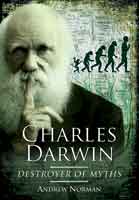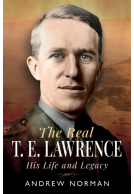Hitler: Dictator or Puppet? (Paperback)
Imprint: Pen & Sword Military
Pages: 224
Illustrations: 30
ISBN: 9781526766663
Published: 13th February 2020
(click here for international delivery rates)
Need a currency converter? Check XE.com for live rates
| Other formats available | Price |
|---|---|
| Hitler: Dictator or Puppet? ePub (3.9 MB) Add to Basket | £6.99 |
Written by an authority on Adolf Hitler, this book charts new ground and shows how the writings of a deluded ex-monk, Lanz von Liebenfels and the pseudo-science of Liebenfels and other writers convinced Hitler that Germanys destiny was to save the world from a Jewish-Bolshevik conspiracy. It was this perverted sense of destiny that drove the Nazi Party and led to the outbreak of the Second World War and the deaths of some sixty million people as well as the destruction of much of Europe. Using the writings of Liebenfels from his magazine Ostara, Dr Andrew Norman demonstrates how the mass murders of Jews, Gypsies, mentally-ill people and those regarded as less than human had its roots in articles written by Liebenfels. An index of Ostara articles is included and their very titles indicate the malign influences that shaped Hitler's Germany.
This short nonfiction book was a good overview or introduction to Hitler. With so many historical fiction novels about the Holocaust and World War II it is always nice to have a nonfiction book to fill in the gaps. Hitler himself isn’t discussed as much in fiction so for readers who mostly learn history through those, this is a great companion book!
NetGalley, Jess Edgar
This is another great insight into what lead the greatest killing machine of all time to do what it did. Andrew Norman explored the writings of deluded Liebenfels which explored the mass murder of gypsies, Jews and more, which were the foundation of the Nazi's objectives. This book was short, but condensed and highly informative. It is well compiled and reads very well. I'd particularly recommend it for those beginning their research on the Nazi party and the notorious Adolf Hitler.
NetGalley, Clara Carter
Andrew Norman’s book helps me to see Hitler from different perspectives. Started with the portrayal of Hitler during his youth, Norman is able to present the Führer‘s entire life. It surely gives the readers such a view in seeing Hitler. Norman also gives an analysis on Hitler’s actions during the Holocaust. It is also surprising tho to know the great thinkers – philosophers, artists, and some great people who were influenced, influenced, and contributed some ideas and values to Nazi.
LITERATURE IS LIVING
I was also enlightened with the word Liebenfels because I have never heard of it previously. It shocked me to know that this harmful thinking has become the catalyst for the Holocaust. Norman later goes on describing Hitler’s personality from different point of views through several discussions about his psychological issues, personality issues, and some others. The way Norman writes in order and the way he delivers his writing in details are always fascinating.
I really think that for a relatively short book, Andrew Norman has done a great job by providing huge numbers of information about Hitler. It makes this book worth reading.
Read the full review here
An interesting read.
NetGalley, Claire Meadows
This is a short book that is extremely well written... It was a well organized biography and a great read.
NetGalley, Cristie Underwood
For a relatively short book, Andrew Norman compacts a ton of information about his subject. Starting from the dictator's youth, Norman chronicles his entire life and the motivations behind his actions during the Holocaust. The first chunk of the book is devoted to philosophers, artists, and other thinkers who influenced the Nazi party's ideals and values. In particular, I had never heard of Liebenfels and was shocked to see how much of his very harmful and deranged thinking was the catalyst for the Holocaust. I was even more shocked to see that a "secret society" he created still has members to this day. Norman goes on to describe Hilter's hubris and self-sabotaging of his mission to conquer the world (thank God!) in great detail, pointing to numerous times his callous choices resulted in his failure. There is also in depth discussion of a possible schizophrenic diagnosis, utilizing first hand accounts to support this theory. The book ends with a summary of the Nuremberg trials and the death of many involved in the atrocities committed in Europe.
NetGalley, Kristina Wilson
While this is never an easy subject matter to read and study, I am nevertheless fascinated by World War II nonfiction. It constantly astounds me how such an obviously disturbed individual was able to gain the amount of power and go virtually unchallenged for decades, all while committing heinous acts and spewing vitriol. This book was fantastically written and I appreciated the immense use of primary sources to illustrates the author's points. I will definitely be reading more from Andrew Norman in the future, as his work is both concise and extremely informative.
Very interesting read... He was such an interesting person to read about.
NetGalley, Lisa Houston
Featured in
The Bookseller, October 2019
The anti-semitic fixation that preoccupied Adolf Hitler until the day he died has long seemed incomprehensible to the well-adjusted mind. The world remains only too well aware of the horrors perpetrated by him and at his instigation. And yet the central question remains: Why? Was he (as is so often suggested) evil incarnate or is there some other explanation for his character and behaviour?
Stephanie A. Jefford
Established author Andrew Norman believes he can at last provide the answer that has eluded us for so long. And this book represents the outcome of a searching enquiry that took the author into Austria as well as Germany and which combines traditional methods of historical scholarship based upon documentary evidence with a modern, innovative approach drawing upon the insights derived from the disciplines of medicine and psychiatry. This makes for a highly original account of his subject and one which suggests some quite fascinating conclusions. Dr Norman manages to dent, along the way, some of the mythology that has lately sprung up around the purported achievements from the early days of the Third Reich, showing that Hitler claimed credit for an economic miracle that in reality originated some time before his rise to power. Evidence is produced to show that resistance by the churches to Nazism may have been more robust that is often supposed (see pp 86-88). He also takes further than most historians his analysis of pseudo-intellectual influences upon the young Hitler and in particular the 0stara publications. His treatment of this theme is more developed, focussed and specific, and he ascribes to the writings of former monk Liebenfels great weight, regarding them as a formative influence upon the mind of the future dictator.
0n another level, there is the story of the tragic fate of Aloisia Veit. Who she was, what happened to her and what that tells us about Hitler and his regime is here revealed for the first time to an English-speaking audience and is in itself an important addition to our knowledge of the history of the Third Reich. Anyone imagining that there is nothing more that can be learned about Hitler at this distance in time will certainly find their assumptions challenged by this interesting and informative book, written with all the insight of one coming from a medical background. You may agree with his thesis; you may disagree; but the author makes his case persuasively, and supports it with evidence. His explanation as to the true nature of the 'puppet', is sure to generate discussion and debate.
Overall this is a curious but interesting book, taking a different approach to Hitler, his beliefs and his crimes.
Historyofwar.org
About Andrew Norman
Andrew Norman was born in Newbury, Berkshire, UK in 1943. He was educated in Southern Rhodesia (now Zimbabwe), Midsomer Norton Grammar School, Somerset, UK, and St Edmund Hall, Oxford.
Andrew worked as a general practitioner in Poole, Dorset, before a spinal injury cut short his medical career. He is now an established writer with biographies of Charles Darwin, Winston Churchill, Thomas Hardy, T. E. Lawrence, Adolf Hitler, Agatha Christie, Enid Blyton, Beatrix Potter, Marilyn Monroe, and Sir Arthur Conan Doyle to his name.




















